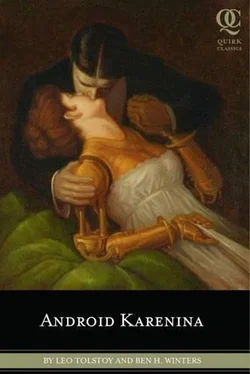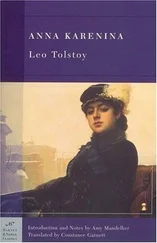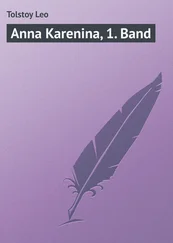Konstantin Levin climbed from the sledge, waved robustly to a gang of Pitbots with their battered but firm charcoal bodies and wide treads, donned his goggles, and stood at the outer radius of the pit. As he stared down into the vast crater, watching his dozens of diligent Pitbots at work, diligent and industrious as honeybees, scurrying to and fro, churning up the Earth with their axes, he felt that little by little the confusion was clearing up, and the shame and self-dissatisfaction were passing away.
He took a last breath of the sulfurous air and walked with Socrates to the house from the side of the pit. As they walked, Levin expressed to his Class III his new resolutions.
“In the first place, from this day I will give up hoping for any extraordinary happiness,” he said. “Such as marriage might have given me.”
“One, no happiness for you,” Socrates parroted faithfully, his master’s use of the set phrase “in the first place” having activated his recording/retaining function-set.
“Consequently I will not so disdain what I really have.”
“Subset of one: no happiness equals no disdain.”
“Secondly, I will never again let myself give way to low passion, the memory of which tortured me so while I was making up my mind to make an offer.”
“Two: absence of low passion.”
Then Levin remembered his brother Nikolai, and made one further resolution. “I will never allow myself to forget him, Socrates.”
“Three: Nikolai preservation dedication.”
“I will follow him up, and not lose sight of him. I will be ready to help if his illness should continue to worsen.”
The snow of the little quadrangle before the house was lit up by a light in the bedroom window of his old mécanicienne , Agafea Mihalovna. She was not yet asleep.
“You’re soon back again, sir,” said Agafea Mihalovna as Levin and Socrates entered.
“I got tired of it, Agafea Mihalovna. With friends, one is well; but at home, one is better,” he answered, and, together with his beloved-companion, went into his study.
COME, IT’S ALL OVER, and thank God!” was the first thought that came to Anna Arkadyevna, when at the Moscow Grav Station she bid good-bye to her brother, who stood blocking the entrance to the carriage till the third bell was heard. She sat down on her lounge beside Android Karenina, and looked about her in the twilight of the sleeping carriage.
On the morning after the float, Anna Arkadyevna had sent her husband a telegram that she was leaving Moscow the same day.
“No, I must go, I must go.” She had explained to her sister-in-law the change in her plans in a tone that suggested that she had to remember so many things that there was no enumerating them: “No, it had really better be today!”
Stepan Arkadyich came to see his sister off at seven o’clock. Kitty had not come, sending a note that she had a headache.
“Thank God!” Anna murmured to her beloved-companion as they settled in the carriage. “Tomorrow I shall see Seryozha and Alexei Alexandrovich, and my life will go on in the old way, all nice and as usual.”
Still in the same anxious frame of mind, as she had been all that day, Anna took pleasure in arranging herself for the journey with great care. With her long, deft fingers Android Karenina opened a discreet mid-body compartment, took out a cushion, and laid it on Anna’s knees. Anna smiled and stroked Android Karenina’s gentle hands in thanks: she had long felt, and felt all the more so at such moments, that she and her darling android enjoyed a bond that was, somehow, stronger than that between other humans and their beloved-companions-even though Android Karenina never breathed a word, indeed lacked even the capacity to elocute, Anna knew in her own heart that there was no one else on Earth, human or robot, who understood or loved her so well.
They were seated across from a kindly elderly lady, but, intending to enjoy a novel, rather than to engage her fellow passengers in conversation, Anna leaned back in her seat and engaged a chitator, putting Android Karenina into partial Surcease. At first her attention was too distracted to follow the story. She could not help listening to the magical, propulsive noises of the Grav as it shot forward on the magnet bed; then the snow beating on the left window and sticking to the pane, and the sight of the muffled II/Gravman/160 rolling by, covered with snow on one side, and the conversations about the terrible snowstorm raging outside distracted her attention.
At last, Anna began to understand the story. Anna Arkadyevna listened and understood, but it was distasteful to follow the reflection of other people’s lives. She had too great a desire to live herself. If she heard that the heroine of the story had fallen ill with malaria, she longed to move with noiseless steps about a sick room; if the chitator had a pirate ship laying siege to a houseboat, she longed to be the one active in its defense. But there was no chance of doing anything, and she forced herself to relax and let the chitator wash over her.
The heroine of the story was already almost reaching her English happiness, a handsome husband and a lakeside estate, and Anna was feeling a desire to go with them to the estate, when she suddenly felt that he ought to feel ashamed, and that she was ashamed of the same thing. But what had he to be ashamed of? What have I to be ashamed of? she asked herself in injured surprise. She switched off the chitator, sank against the back of the chair, and glanced at Android Karenina to help her understand, but her faceplate in Surcease was perfectly smooth and unreflective, revealing nothing.
There was nothing! She went over all her Moscow recollections. All were good, pleasant. She remembered the ball, remembered Vronsky and the crackle of his hot-whip and his face of slavish adoration, remembered all her conduct with him: there was nothing shameful. And for all that, at the same point in her memories, the feeling of shame was intensified, as though some inner voice, just at the point when she thought of Vronsky, were saying to her, “Warm, very warm, hot.”
“Well, what is it?” she demanded of Android Karenina, though she knew the Class III could hardly respond while in Surcease. “What does it mean? Am I afraid to look it straight in the face? Why, what is it? Can it be that between me and this officer boy there exists, or can exist, any other relations than such as are common with every acquaintance?”
But, as is the way with many people who have difficult questions, but not the will to hear them answered, she asked her questions of a Surceased robot, who of course offered no response.
Anna laughed contemptuously at her own foolishness, and reactivated the chitator; but now she was definitely unable to follow what she heard.
Unthinkingly, she lifted Android Karenina’s smooth hand and laid its cool surface onto her cheek, and almost laughed aloud at the feeling of delight that all at once without cause came over her. She felt as though her nerves were strings being strained tighter and tighter on some sort of screwing peg. She felt her eyes opening wider and wider, her fingers and toes twitching nervously, something within oppressing her breathing, while all shapes and sounds seemed in the uncertain half-light to strike her with unaccustomed vividness.
In this strange and disjointed sense of hyperawareness, it took her eyes a long moment to fully register what she then saw across from her: a koschei, bronzish, pencil-thin and centipedal, crawling on dozens of tiny, hideous feet across the wrinkled neck of the dozing elderly lady seated across from her.
The skittering steps of the miniature bug-robot were hardly heavy enough to wake the sleeping woman, and Anna thanked God at least for that small mercy. Surely the very sight of the skittering koschei-for that must be what this was, one of the hideous little insect-like death-machines used by UnConSciya to terrify the Russian populace-would cause the old woman to panic, and panic would seal her doom. Anna, murmuring a prayer for courage, scrunched forward in her seat, raising one hand, her fore- and middle fingers primed for plucking… slowly, carefully, she raised her hand, never taking her eyes off the automaton crawling in and out of the wrinkled folds of the ancient woman’s neck flesh.
Читать дальше












